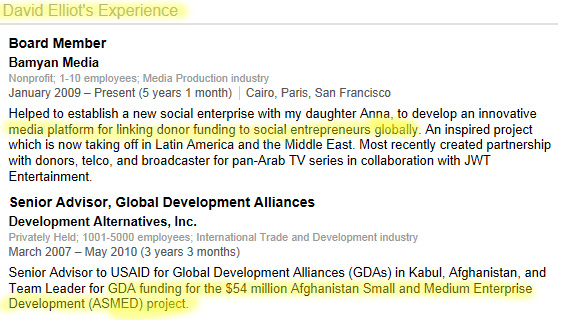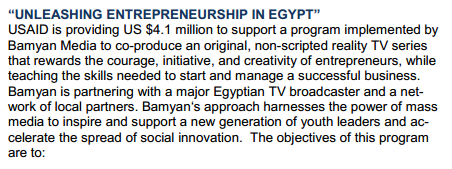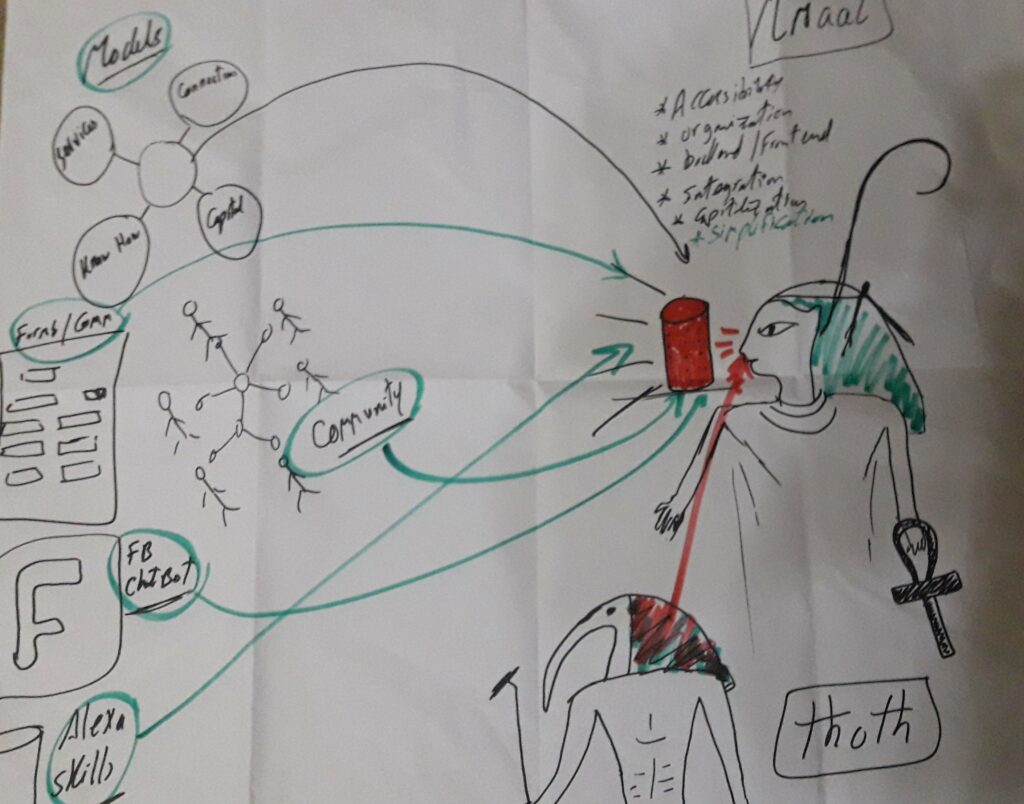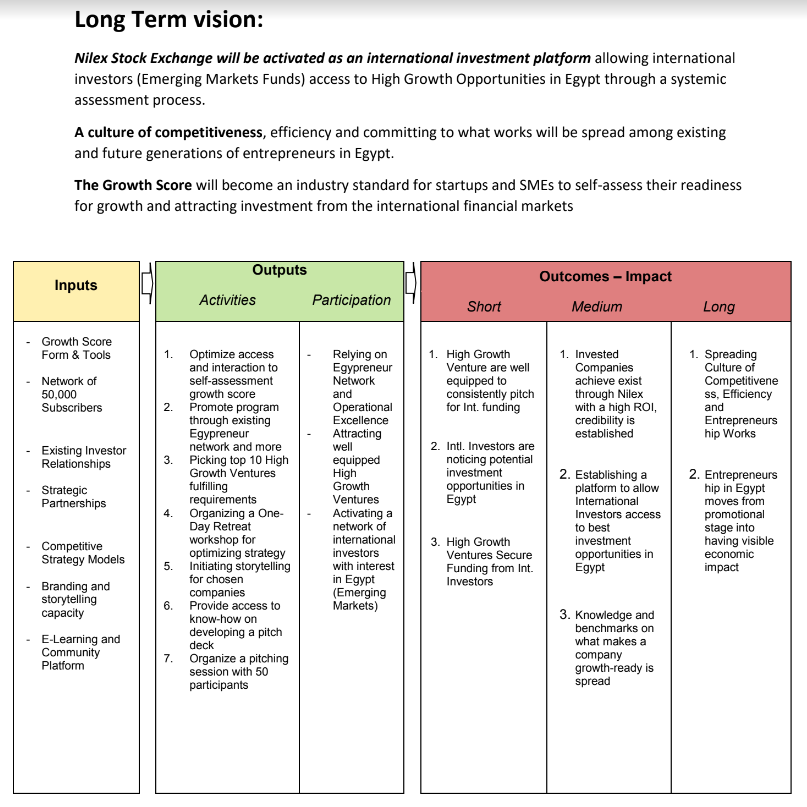After the striking wave of criticism the launch of ElMashrou3 was received with from entrepreneurs and despite all possible PR and Advertising tricks the money can buy; the opinion of professionals and obvious impact assessment have shown a great failure to a potentially massive project to Unleash Entrepreneurship in Egypt, for which the United Sates Development Agency seeded Bamyan Media with a $4.1 Million Cheque.
My blogs in this regard started as an observation to the feedback shared by entrepreneurs and knowing only little of behind the scenes from what I experienced with Bamyan Media, this topic evolved into an actual investigation as each communication I received led to another and ended up with mega stories of what is really going on there. The scope of corruption and deceit with which Bamyan Media dealt with their surrounding is extremely unbelievable.
Not to repeat myself, please refer to my other post Who is really behind El Mashrou3, to tack down the evidence of the entity controlling the project and its background.
There goes a lot of in-depth look of the work of Bamyan Media and it’s first ever project, El Mashrou3 in Egypt:
- Strategy
- Track record
- The Funding
- Production Industry
- Media Agency
- Entrepreneurship / Egypreneur
- Contestants
- Waste of energy and resources
Strategy
The business strategy of Bamyan Media is quite clearly stated in the LinkedIn profile of David Elliot, the one actually running Bamyan Media, I understand it might be quite sensitive to state that as David Elliot is obviously doing everything possible to make his daughter, Anna Elliot, feel like in charge, but her lack of any basic CEO skills make this extremely obvious.

Bamyans Approach is to access resources directed towards social entrepreneurs around the world and supposedly channel these resources, through some kind of “media platform” into social entrepreneurs. If we search for definition of Corruption and Mismanagement well find that most cases of corruption in development around the world is about entities that access large pools of resources and misdirect, mismanage or use these resources for private gains.
If we briefly survey entrepreneurs in Egypt whether they have sensed the $4.1 Million USD or whether it directly or indirectly contributed to Unleashing Entrepreneurship in Egypt, the response will be very obvious, if we add to it the fact that the non profit corporation Bamyan Media and its founders own a Limited Liability Company in Egypt that was created based on the assets of their project in Egypt, we will know who is really profiting from this.
Corruption is positioning yourself as a receiver of “donor” funding that you are not only unable to manage, but you abuse the whole surrounding in the process of trying to make use of it, the business strategy of Bamyan Media as stated by David Elliot is a perfect example of positioning for corruption.
Track record
Bamyan Media was awarded a $4.1 Million USD grant to “Unleash Entrepreneurship in Egypt”, Bamyan Media established in 2010 as per their website, had absolutely no track record in performing any of these activities, though, the only argument is that Anna Elliot, the daughter of Mr. David Elliot and presumably CEO of Bamyan Media was the “executive producer” of a similar TV Show in Afghanistan executed by USAID.
This part is covered in my post: Who is really behind El Mashrou3, makes it obvious that the show in Afghanistan was executed by USAID itself with funds from ASMED project which was managed by David Elliot, furthermore, by this time Anna Elliot was a student at Hampshire university and part time bar-tender she didnt qualify even as a junior producer to be credited as a the executive producer of a TV Show.
Meaning that the only supporting reason behind bringing Bamyan Media to Egypt was the fact that David Elliot managed a $54 Million USD funds for USAID in Afghanistan, part of which was used in funding a pilot season TV Show there, then with his daughter they set up Bamyan Media to continue running the same model at different environments where there are any “grant” money directed towards entrepreneurship according to the strategy above.
This is very striking in USAID’s approach in contracting entities for impact, which obviously known to be former consultants with no experience or linkage to the economy who can cover up all their shortcomings through clever PR machines and creating a network of beneficiaries who would be interested in covering up on these cases of corruption and mismanagement for pieces of the pie.
The Funding
In this official document from USAID Egypt Entrepreneurship Fact Sheet, its confirmed that Bamyan Media, with no track record was able to secure $4.1 Million USD for their operation in Egypt. It is not an easy job for anyone around the world, but it sounded like a piece of cake for the Elliot’s. When I first met David Elliot on a one-on-one basis which resolving a strategic conflict he did everything possible to claim that he just joined his daughter after she started Bamyan Media which recently while looking at the background of the organization proved to be completely false. Why so keen on hiding this background?

U.S. State Department try to reflect pride in big numbers for supporting youth and entrepreneurs in Egypt and region, while USAID comes along as a PR initiative that doesnt mind, intentionally or unintentionally wasting potential for the sake of a few good mouths and a few articles in western news sites that doesnt take the effort to investigate real impact on the ground.
The funding which was granted for a non-profit was then used in setting up a Limited Liability Company, EL Mashrou3 LLC, registration number #63834 that its founders and cashing out from right now, even more, as they had no understanding of what they should be doing with the funds, Bamyan Media abused an unbelievable number of professionals, local entrepreneurs and even one of the largest media agencies in the world on their way to graduating El Msahrou3.
Below are some of these cases:
Production Industry
I interviewed exactly 7 producers who repeated the same story of the manipulative, amateurish, unethical approach of Bamyan Media. Beside David Elliot and Anna Elliot, Bamyan Media was joined by Asim Haneef, he was credited as the Executive Producer for the show, but practically speaking he was as far from production as it can be, following the same pattern of crediting Anna Elliot as Executive Producer of the TV Show in Afghanistan, Asim Haneef is obviously trying to use his journalistic background in building the image of Bamyan Media and expand their business in different countries.
My first accidental interview was with Mohammad A., the producer of the popular Khawater TV Series, he mentioned to me that when they arrived to Egypt, they tried to reflect their preference to work with him, while they shied away from presenting the TV Show produced in Afghanistan, as of being amateurish, Mohamed worked on formatting the concept for production, while is almost equivalent to starting from the scratch, meaning, they came with nothing, he also managed to introduce them to a TV Network which accepted the project.
As the reformatting was done and introduction to the channel made, Bamyan Media turned their back on Mohammad A. and proceeded with their project then when they wanted to access the TV Network, they were turned down by the network which didnt knew them rather they approved the project for him, they were forced to get back to him and as he states it as a result of their manipulative, unethical approach he unreasonably increased the production budget to turn them away and he preferred to keep a cool personal relationship away from work.
What happened with the producer of Khawater was repeated dozens of times with the rest of the production industry in Egypt to the extent that Mr. Hisham Mahmoud former Vice President of ONTV mentioned that Egypt always had a mature, decent media industry, such abusive, unethical behavior was never witnessed in his years of experience.
Hisham Mahmoud former Vice President of ONTV also had more serious experience, he was brought aboard as a Senior Producer with the mission to aid the work on raising corporate funding for the production of the TV Show, Bamyan Media intended to use the $4.1 Million granted from USAID for its own operation and rather as its easier once you have the setup raise the production cost from corporate sponsors, initially a budget of 10-12 Million EGP was estimated, then reduced into $1 Million dollar.
Mr. Hisham states that they had colorful promises that attracted a lot of people as the media industry is challenged since Jan 2011, yet, they used some bureaucratic limitations imposed from USAID not to commit beyond three months with their sub-contractors, which as per his saying, was only a trick to get the juice and skip the payment.
The experience of Mr. Hisham Mahmoud included using him to initiate communication with potential sponsors and skipping his commission once deals are secured against the agreement made, using the three months limitation period as a legal cover. He also goes further to mention a weird situation when he arranged a meeting with a Senior Director at a leading Egyptian Bank that was interested in sponsorship, yet, David Elliot heard about a study conducted by the bank and got unreasonably clingy in accessing information, he says, the bank turned down the offer because of Elliots suspicious behavior relating to accessing the important economic study.
I always wanted to do something about this but never had the time and focus to, Mr. Hisham Mahmoud mentioned to me by the end of our meeting, this should really be known, it should be known that we have a decent and mature media industry in Egypt, I have never in my past professional experience ran by such manipulative, unethical example, who repeated the story with plenty of others.
Tamer E., Director of the popular Ray7een 3ala Feen Reality TV Show is also one of the Directors/Producers who was brought aboard, Tamer sensed the amateurish approach early on, after being squeezed for basic information and as he described it feeling violated like never before. Tamer excused himself from further involved with an SMS communication stating that The Dynamics are Awkward.
Another production house in Maadi witnessed a repeated story, after Bamyan Media approached them to lead the production for the show and they got the word, Asim Haneef requested a one-on-one meeting with one of three partners of the firm and offered her to join on her own individual capacity, which obviously is betraying the interest and trust of her partners, Haneef didnt find any issues with repeating the same pattern with several organizations, the situation fired back as she responded in an aggressive email communication CCing her partners that this was very stupid and unethical to propose.
It seems that Asim Haneef has repeated the same approach with several other organizations, the attitude of snitching, stealing and manipulating is not an attitude of someone who want to stay, we are a small industry and everyone knows everyone, no one would work with Bamyan Media anymore after being known for deceit and manipulation, main partner of the Production House stated, while requested Asim Haneef to be brought into the office, youll find half the production industry so keen on kicking his butt as he described it.
I was given plenty of other names and contacts for producers and production houses who were brought aboard, but this was enough for me to understand how they approached the production industry.
Furthermore, I was told another awkward story from the production house they finally worked with, I never had the chance to verify it and prefer not to publish it until its verified from its source.
Media Agency
Bamyan Media strike a strategic partnership with a leading Media Agency in the states before coming to Egypt where they started working with their local office on their branding and media strategy, I followed up with a lead that founder of Bamyan Media claimed before being over charged by the agency, as I went through a print out of Bamyan Medias account with the agency in a meeting with their CEO, It was clear who is lying, plus, the fact that, probably for emotional reasons, Bamyan Media didnt pay 70% of its pending installments to the agency and they might go for a legal action from their US office.
Moreover, the Media Agency CEO mentioned that Bamyan Media repeated the same pattern of behavior with professionals and production houses with the media agency, the agency brought an expensive format editor to write the format for the show, the agency endured the cost which was supposed to be covered from sponsors, upon securing the sponsorship deals Bamyan Media cut their relationship with the agency and denied payment, the CEO said that they used a void in the contract to avoid that, given that it was their fault they didnt request payment except for direct services.
At some point Bamyan Media announced being sponsored by a Major telecom, it seems like David Elliots attitude was repeated in a meeting with the CMO of the same teleco that resulted on turning down their offer, he was crazy, shouting at the CMO of a major teleco while securing a sponsorship deal? commented the CEO of the media agency.
To be continued
![[Nile TV] The Potential for Smart Voice Assistants](https://abdomagdy.com/wp-content/uploads/2024/04/15-750x350.jpg)

![[Nile TV] Nurturing the White Rabbits for Boosting Organizational Performance](https://abdomagdy.com/wp-content/uploads/2024/04/14-750x350.jpg)
![[Nile TV] Finding The Right Coaches](https://abdomagdy.com/wp-content/uploads/2024/04/13-750x350.jpg)
![[2019] [Project] [Egypreneur] Automated Funding Assistant, Business Builders’ One-Stop-Shop.](https://abdomagdy.com/wp-content/uploads/2015/10/VT-cropped-491x350.jpg)


![[Nile TV] Building Meaningful Connections in the Workplace](https://abdomagdy.com/wp-content/uploads/2024/04/12-750x350.jpg)

![[Nile TV] Leadership & Social Dynamics](https://abdomagdy.com/wp-content/uploads/2024/04/11-750x350.jpg)
![[Nile TV] The On-Demand Economy](https://abdomagdy.com/wp-content/uploads/2024/04/10-750x350.jpg)
![[Nile TV] Social & Power Dynamics in the Workplace](https://abdomagdy.com/wp-content/uploads/2024/04/9-750x350.jpg)
![[Nile TV] Entrepreneurship & The Economy](https://abdomagdy.com/wp-content/uploads/2024/04/8-750x350.jpg)
![[Nile TV] Green Entrepreneurship Ecosystem](https://abdomagdy.com/wp-content/uploads/2024/04/7-750x350.jpg)
![[Nile TV] Tech Trends to Boost Egyptian SMEs](https://abdomagdy.com/wp-content/uploads/2024/04/6-750x350.jpg)
![[Nile TV] Egyptian Coastal Cities as Potential Startup Hubs](https://abdomagdy.com/wp-content/uploads/2024/04/5-750x350.jpg)
![[Nile TV] What Egyptian Business Owners Can do about Devaluation of EGP](https://abdomagdy.com/wp-content/uploads/2024/04/4-750x350.jpg)
![[Nile TV] Public Speaking and Presentation Skills for Business Executives](https://abdomagdy.com/wp-content/uploads/2024/04/3-750x350.jpg)

![[Nile TV] Addressing Technology Disruption For Business Builders[Nile TV]](https://abdomagdy.com/wp-content/uploads/2024/04/2-750x350.jpg)
![[Nile TV] Challenges And Opportunities in Starting a Business In Egypt in 2016](https://abdomagdy.com/wp-content/uploads/2024/04/1-750x350.jpg)












